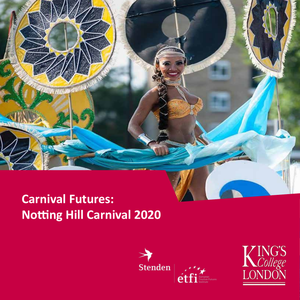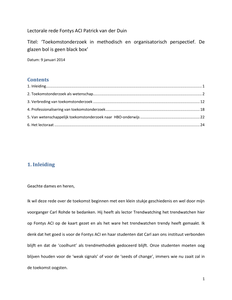Deze publicatie richt zich vooral op het concept Design Based Research,gezien vanuit het perspectief van de bijna 40 lectoren die de hogeschool rijk is. Dit lectoratenoverzicht kan worden beschouwd als een atlas of reisgids waarmee de lezer een route kan afleggen langs de verschillende lectoraten. De lectoraten die actief zijn op het gebied van de Service Economy worden beschreven in hoofdstuk 2. De lectoraten die actief zijn op het gebied van Vitale Regio worden beschreven in hoofdstuk 3. De lectoraten die actief zijn op het gebied van Smart Sustainable Industries worden beschreven in hoofdstuk 4. De lectoraten die actief zijn op het gebied van de hogeschoolbrede thema’s Design Based Education en Research worden beschreven in hoofdstuk 5. Tenslotte wordt er in hoofdstuk 6 een eerste aanzet gedaan om één of meer verbindende thema’s of werkwijzen te ontdekken in de aanpak van de verschillende lectoraten. Het is niet de bedoeling van deze publicatie om een definitief antwoord te geven op de vraag wat NHL Stenden precies bedoelt met het concept Design Based Research. Het doel van deze publicatie is wel om een indruk te krijgen van wat er allemaal gebeurt binnnen de lectoraten van NHL Stenden, en om nieuwsgierig te worden naar meer.
DOCUMENT

Futures Literacy (FL), developed by UNESCO (2014), is a capability that provides insight into how we approach unforeseeable challenges by using the future to innovate the present (Miller, 2015). When we only use the past to predict the future, detecting novelty is difficult. By knowing how we are using the future, we can integrate complexity and novelty in our choices and therefore make better decisions. Hanze University has adapted FL to higher education by developing intensive Futures Literacy Knowledge Laboratories (FLKLs) for Professional Masters. This paper focuses on the hypothesis that participants become more Futures Literate after participating in a Lab. Operationalizing underlying skills and measuring improvement during FLKLs is an important step towards an evidence-based approach. Therefore, this paper will focus on the development of a method of measurement that is aimed at measuring the effects of the FLKLs.
DOCUMENT
De dissertatie "Probing Futures, Acting Today" van Caroline Maessen onderzoekt hoe organisaties alternatieve toekomsten kunnen verbeelden om dagelijkse toekomstvormende praktijken te veranderen teneinde complexe maatschappelijke uitdagingen aan te pakken. Organisaties hebben de neiging door lineair denken hun verbeeldingsvermogen te beperken tot conventionele toekomsten, wat effectieve reacties op problemen zoals klimaatverandering en sociale ongelijkheid belemmert. Het gevolg is dat na de zoveelste heisessie voor visieontwikkeling, er nog steeds niets fundamenteel verandert. Hoe de toekomst zich ontvouwt, tegen de achtergrond van maatschappelijke complexe problemen, gaat vaak voorbij onze collectieve verbeeldingskracht. Organisaties hebben moeite om zich te verbinden met onconventionele toekomsten en acties in het heden daarop af te stemmen. Voor betekenisvolle verandering moeten organisaties navigeren tussen de aantrekkingskracht van inspirerende onconventionele toekomsten en de behoefte aan stabiliteit en controle. Maessen heeft in twee (semi) publieke organisaties onderzocht waarom dit zo lastig is en hoe organisaties daarin ondersteund kunnen worden.
DOCUMENT

In the last month, the Visual Methodologies Collective participated in Regenerative Futures, a month-long design challenge to envision what a more desirable future could look like. Launched by SPACE10, a research and design lab based in Copenhagen, the call invited to use different AI generative models to develop a vision of the future home, community, or city.The call invited to reflect on different speculative briefs: resilient futures (How will future communities co-exist with non-human species? And how might the design of our homes and communities nurture surrounding ecosystems?), symbiotic futures (As we look to the future, how can we design homes as spaces of refuge and resilience? How will they flex to sudden climatic changes, while being conscious of the land and ecology around them?) collective futures (What would a self-sustaining city look like? How can we adapt and evolve existing structures and streets to better support collective living?)
MULTIFILE
This overview article for the special issue on ‘Desirable Transport Futures’ sets out with a brief introduction of the current development of the global transport system, suggesting that it remains unclear whether transport systems are heading towards desirable change. This desirability is defined as a reduction in the system's negative externalities, including accidents, congestion, pollutants and/or noise, while retaining its functionality. There is evidence that transport externalities continue to grow with an increasingly mobile and growing global population. Against this background, the article discusses what may constitute more desirable transport futures, as well as the barriers that have to be overcome to move towards such futures. The article concludes that transport governance will be essential to far-reaching change, and that greater focus has to be placed on individual and societal socio-psychological perspectives shaping mobility consumption. Nine papers contained in this special issue provide in-depth analyses of transport systems, as well as insight into how these may be changed in more systemic ways. A concluding research agenda is offered that outlines a number of innovative approaches researchers may pursue as part of further efforts to engender desirable transport futures.
LINK
We propose aesthetic engagement as a valuable construct for organisation studies to advance its contribution to organising for sustainability. Aesthetic engagement is defined as a set of material practices that re-engage humans and systems to trigger and accelerate transitions towards regenerative futures. We adopt an aesthetic, practice-based approach to study the emerging field of circular fashion, zooming in on six research projects evolving around bio-based textile design. Our results show that matter needs to matter more in sustainable organising in three key material practices: (1) re-presenting alternative systems, (2) re-imagining affective materialities and (3) re-claiming embodied ethical agency. Matter that reflects new ‘imagined’ realities - whether in artefacts, bodies or socio-material spaces - could greatly support stakeholder engagement and collective identity-building towards transitioning to regenerative futures.
DOCUMENT

Carnival Futures: Notting Hill Carnival 2020 is a King’s Cultural Institute project led by Nicole Ferdinand (Culture, Media and Creative Industries at King’s College London) which sought to engage cultural organisations and other stakeholders in planning for the future of the Notting Hill Carnival. The content of this report is intended as a contribution to current research and to identifying future directions for the development of the Notting Hill Carnival. The material and views expressed are produced by various stakeholders in a series of workshops.
DOCUMENT

The challenge of mitigating climate change is critical to desirable tourism transportation futures, although to date relatively little attention has been paid to this aspect of sustainable tourism. This introductory article to the special issues on ‘Desirable Tourism Transport Futures’ explores approaches to transitioning the tourism sector to a sustainable emissions path. It starts by describing an undesirable tourism transport future associated with a business-as-usual scenario, which will inevitably cause the climate mitigation goals outlined in the Paris Climate Accord to soon become unattainable. We then outline a scenario for a climatically desirable future, and its social and economic implications. It is important that desirable tourism transport futures are critically considered in terms of both spatial and temporal scale. The scenarios that inform this editorial provide some insights at the long-term macro-scale. These scenarios are associated with desirable and undesirable elements that will no doubt continue to be the subject of much debate and contestation. While these scenarios will represent both opportunities and threats to the full spectrum of tourism industry stakeholders, they should also inform manifold avenues of future research at a critical moment in the evolution of tourism transportation and the pursuit of the UN Sustainable Development Goals.
LINK
In light of increasing cashlessness, platform economies, Open Banking APIs, financial bots and cryptocurrencies, money is on the move - once inert, money is gaining agency, becoming programmable, automated, data-driven and part of 'more than human' infrastructures. These financial futures demand that designers engage with difficult questions of economy and value, while retaining a sensibility to the many subtle and social qualities of money and our everyday economic interactions. This one-day workshop will therefore bring together practitioners and researchers to explore design challenges related to four broad themes: Designing with Transactional Data; Designing Alternative Representations of Value; Money, Automation, Power, and Control; and Financial Futures with Vulnerable Users. Developing scenarios related to these themes, the workshop will cultivate a rich design space to establish the value of design-led research in shaping our financial futures.
MULTIFILE

Introductie van het lectoraat Futures Research & Trendwatching.
DOCUMENT
